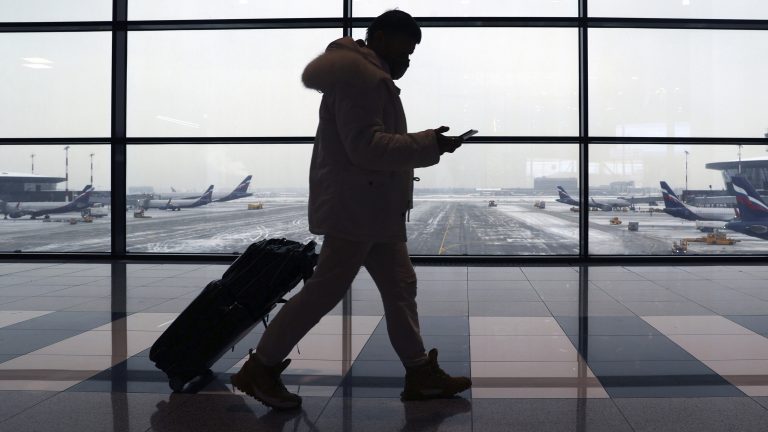Sergei started thinking about leaving Russia the day the country launched its invasion of Ukraine. Within three weeks, Sergei, who is Russian, and his Ukrainian partner had left their home in St. Petersburg, where Sergei had lived for five years, and fled to the Serbian capital, Belgrade, via Istanbul.
Sergei, an app and website designer whose name has been changed to protect his identity, told Rest of World he’s one of many people he knows who have left Russia or are thinking about doing so. Out of the 1,000 people in his university alumni Telegram channel, 70 have joined a group discussing life in Turkey. When he was in Istanbul, he said, Starbucks cafés were full of Russians on laptops. Others are fleeing to countries where Russians can easily get visas, including Cyprus, where there’s a sizable Russian business community, or even to India.
The fallout from Russia’s invasion of Ukraine has isolated the country from large parts of the global economy. Financial sanctions mean that international markets have effectively closed to Russian tech companies, and freelancers working for overseas clients are struggling to get paid. Major global tech companies, including Apple and Microsoft, have suspended their operations in Russia, and others have ended their relationships with local companies, leaving employees and contractors to an uncertain future. Meanwhile, the government is tightening its control over the internet and clamping down on opponents. As the war continues, many young men fear that conscription is imminent. For people like Sergei, it’s no longer tenable to remain.
“The IT people and knowledge workers who can work online, basically, they all left,” Sergei said. Those who cannot leave their jobs to work remotely are “depressed and terrified.”
The Kremlin introduced new measures to support tech companies last week, including lowering corporate taxes from 3% to zero. But the sector is in disarray. The country’s largest tech firm, Yandex, warned it might default on its debt last week. According to Israeli media outlet Haaretz, it is mulling relocating 800 of its employees to Israel. Several international companies have begun to relocate their operations and are trying to move staff, others have just cut off their local partners.
“Not only do these measures halt any cooperation but also close the market for Russian companies in Western markets,” Aleksander Lubojemski, an analyst at consultancy Access Partnership, told Rest of World.
The mood among tech entrepreneurs is “shell-shocked,” Roman Shaposhnik, the Russia-born co-founder and CTO of edge computing company Zededa, which is headquartered in Silicon Valley, said. Zededa’s Russia-based employees have moved to Berlin.
Shaposhnik said that while people want to get out of Russia, many don’t want to abandon the careers they’ve built and hope that their exile will be only temporary. “It’s something that they worked on for five to 10 years of their life. And now, the prospect of just giving it up is just brutal,” he said.
With help from venture capital firm Almaz Capital, Shaposhnik is providing advice to companies and entrepreneurs looking to move their operations — and their families — out of Russia to Cyprus, which already hosts a sizable community of Russian businesses. He has dubbed the initiative Paperclip Project, after Operation Paperclip, a controversial U.S. government program that secretly brought German scientists, engineers, and technicians to U.S. soil after World War II. Shaposhnik said the total number of people he expects to help move will be in the hundreds.
“We already have had a free internet for many years. … We truly can’t imagine life without it.”
The IT industry comprises less than 1% of Russia’s GDP, according to 2021 research from the Higher School of Economics University. However, entrepreneurs are often drivers of the economy, and the economy will, eventually, feel their absence. “I don’t think it will be an immediate effect, but it’s more of a brain drain effect,” Shaposhnik said. “A lot of people are trying to figure out how they can get their professional life on track just outside of Russia.”
Young peoples’ concerns are not just professional. Russian men are obligated to serve 12-month military service, and the army consists of professional soldiers, reservists, and conscripts. Russian President Vladimir Putin said on Monday that the country would not send conscripts or reservists to fight in Ukraine. However, on Wednesday, Russia’s defense ministry acknowledged that some conscripts were taking part in the conflict with Ukraine. Sergei is a Russian army lieutenant in reserve, which he thinks puts him first in line for the draft.
Others are just unwilling to live under the new restrictions. Many Russians in their 20s and 30s grew up in an environment where the internet was relatively free. They’re used to being able to communicate with the world. In the past, some young Russian entrepreneurs have been vocally supportive of the opposition on social media. But the climate has become much more restrictive since the war began. Russia blocked access to Facebook last week and has throttled Twitter. The government has introduced new rules that threaten 15 years in prison for publishing what Moscow deems to be “fake information” about Russia’s invasion of Ukraine.
For Viktoria, an employee of an international IT company in Russia, being cut off from platforms such as Instagram and Facebook would mean losing access to the outside world, including her friends in Ukraine.
“We already have had a free internet for many years. … We truly can’t imagine life without it,” she said. “It’s the same thing when [a] political regime is degrading from democracy to authoritarian or totalitarian regime. You had everything and then you lose it all.”
Viktoria, whose name has been changed for her safety, has already decided to leave. “I bought a one-way ticket from Russia 10 minutes ago, and that’s it,” she said.



